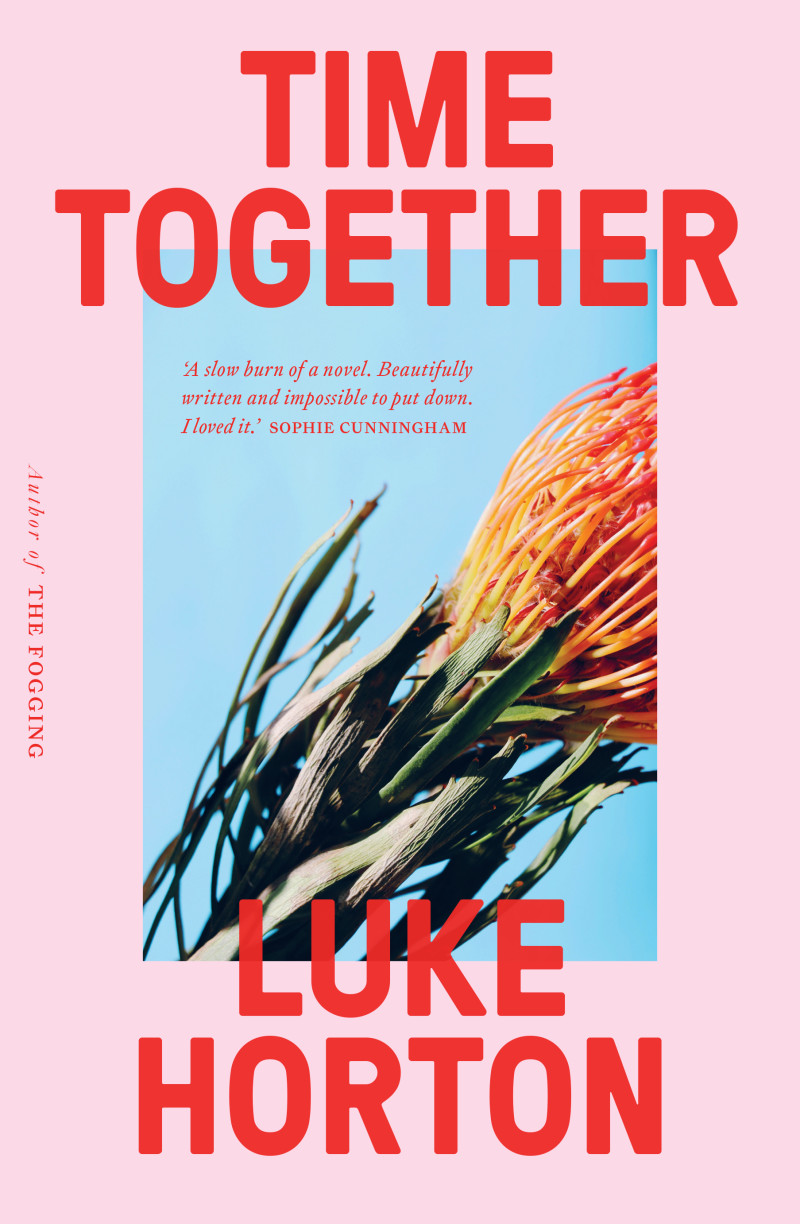
- Free Article: No
- Contents Category: Fiction
- Review Article: Yes
- Article Title: We need to talk
- Article Subtitle: A novel about friendship and mess
- Online Only: No
- Custom Highlight Text:
‘Maybe narrative structures didn’t work at all in the world of nature, the real world. Story arcs, character development. Maybe that was part of the problem – our need to make everything a stupid story, to narrativise, when really all this wasn’t a “story” at all. It was something else altogether.’
- Book 1 Title: Time Together
- Book 1 Biblio: Scribe, $34.99 pb, 276 pp
- Book 1 Cover Small (400 x 600):

- Book 1 Cover (800 x 1200):

- Book 1 Readings Link: https://www.readings.com.au/product/9781761380921/time-together--luke-horton--2025--9781761380921#rac:jokjjzr6ly9m
The central character is Phil. He is staying at the comfortable beachside home of his father – who is staying elsewhere – and his mother, who has died recently and whom Phil is mourning, though not demonstrably. He has invited along a group of old friends, most of whom he sees infrequently but with whom he shares a long history. Like Phil, they have entered early middle age. First come Bella and Tim, with their kids Millie and Paul. The next day Jo and Lucas arrive with their child Maxie and Annie, an old friend who might or might not be of romantic or at least sexual interest to Phil.
These are educated, middle-class people. Lucas is a Marxist academic who can tell Phil that the master-slave dialectic originates with Lacan and Hegel. Phil also works in academia, having fallen into it with little real commitment. In holiday mode, our protagonists largely shunt professional interests aside.
It is summer and the seaside residence is a hothouse in more ways than one. To Bella, the house is ‘neat and tidy and dead’. To Tim, Phil seems ‘frail, weak, but kind of manic at the same time’. Millie, cusping puberty, is refusing to speak to her mother, though neither Bella nor the reader know why. Bella in turn tends to blurt and seems a little manic or, in Millie’s word, ‘psycho’. As she confesses: ‘I do not want to hold anything back. I am not any good at it … I am either all in or all out.’
The holiday nerve centre scenario is a similar setting to that of Horton’s début novel, The Fogging (2020), in which a couple on vacation in Bali meet another couple and their child, strike up a friendship, and spend hours and days together in a way that alters the dynamic between the male protagonist and his wife. In that novel, the titular ‘fogging’ – a wholesale spraying of insecticide – upends the relationship altogether. Will such a pivotal event mark Time Together? Such looming possibilities recall The Slap (2008), where relationships crack open following one incident. While emotions are heightened, Horton’s novel generally resists the dialled-up conflicts that successfully propel Christos Tsiolkas’s novel, opting for a quieter unveiling that admirably serves his project.
As if clinging to remnant youth, the adults drink heavily, dabble in prescription and other drugs (‘the drugs were good’), and, on one of their last nights together – one they decide is the night – harden their intake in a conscious effort to push themselves to other realms while the children sleep. Phil consumes a cocktail of substances, making him edgier – though edginess has long marked his interactions – and sometimes cruel, ‘animalistic’.
The characters push boundaries with each other. The house and its environs are a kind of testing ground. Millie articulates this late in the novel when she says of her mother: ‘I wanted to punish her but also maybe push her, to show how she really felt … I also wanted to see it, what she might do. It’s fucked up, I know.’
Underlying most exchanges is an understanding that each person is, for the most part, in a safe enough space, to use common parlance. Annie can tell Phil he is an arsehole without ruining their friendship. The years have granted a measure of mutual trust. Which is not to say there are not genuine strains, as one character then another struggles to fathom whether they feel love or hate. A prevailing tension threatens to explode into something more.
The third-person narration shifts from one protagonist to another; we access the sometimes confused and conflicted words and thoughts of each. Together or singly, they prepare meals, go for walks, swim – including across a channel that is generally safe but not entirely free of hazard. They visit an old ruin as well as Phil’s nearby home town, muse to themselves, talk with and about each other a good deal. Parents and parenting are much discussed (and yes, Philip Larkin’s ‘They fuck you up, your mum and dad’ is quoted).
All this demands patience of the reader, but rewards come via Horton’s nuanced characters, who rise well above the stereotypes of difficult or insecure people. They are not easy to love, but we come to understand something of Bella’s destructive self-doubt, Annie’s need to be loved, Lucas’s self-containment, Jo’s belligerence, Tim’s reliably good nature, and Phil’s general disillusionment – he is lost in ways that will be familiar to most of us.
Having opened with Annie, with her we might close: ‘Despite the mess, what she felt right now, most of all, still, was gratitude. For being included at all in the mess of these other people’s lives. Other people she loved. She wouldn’t really want it any other way.’


Comments powered by CComment